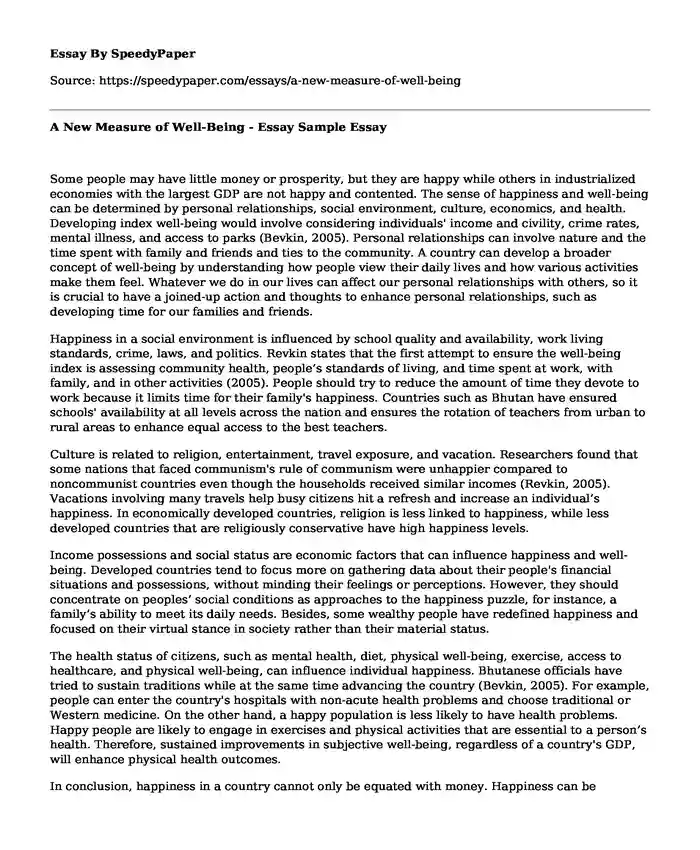Some people may have little money or prosperity, but they are happy while others in industrialized economies with the largest GDP are not happy and contented. The sense of happiness and well-being can be determined by personal relationships, social environment, culture, economics, and health. Developing index well-being would involve considering individuals' income and civility, crime rates, mental illness, and access to parks (Bevkin, 2005). Personal relationships can involve nature and the time spent with family and friends and ties to the community. A country can develop a broader concept of well-being by understanding how people view their daily lives and how various activities make them feel. Whatever we do in our lives can affect our personal relationships with others, so it is crucial to have a joined-up action and thoughts to enhance personal relationships, such as developing time for our families and friends.
Happiness in a social environment is influenced by school quality and availability, work living standards, crime, laws, and politics. Revkin states that the first attempt to ensure the well-being index is assessing community health, people’s standards of living, and time spent at work, with family, and in other activities (2005). People should try to reduce the amount of time they devote to work because it limits time for their family's happiness. Countries such as Bhutan have ensured schools' availability at all levels across the nation and ensures the rotation of teachers from urban to rural areas to enhance equal access to the best teachers.
Culture is related to religion, entertainment, travel exposure, and vacation. Researchers found that some nations that faced communism's rule of communism were unhappier compared to noncommunist countries even though the households received similar incomes (Revkin, 2005). Vacations involving many travels help busy citizens hit a refresh and increase an individual’s happiness. In economically developed countries, religion is less linked to happiness, while less developed countries that are religiously conservative have high happiness levels.
Income possessions and social status are economic factors that can influence happiness and well-being. Developed countries tend to focus more on gathering data about their people's financial situations and possessions, without minding their feelings or perceptions. However, they should concentrate on peoples’ social conditions as approaches to the happiness puzzle, for instance, a family’s ability to meet its daily needs. Besides, some wealthy people have redefined happiness and focused on their virtual stance in society rather than their material status.
The health status of citizens, such as mental health, diet, physical well-being, exercise, access to healthcare, and physical well-being, can influence individual happiness. Bhutanese officials have tried to sustain traditions while at the same time advancing the country (Bevkin, 2005). For example, people can enter the country's hospitals with non-acute health problems and choose traditional or Western medicine. On the other hand, a happy population is less likely to have health problems. Happy people are likely to engage in exercises and physical activities that are essential to a person’s health. Therefore, sustained improvements in subjective well-being, regardless of a country's GDP, will enhance physical health outcomes.
In conclusion, happiness in a country cannot only be equated with money. Happiness can be achieved through shared prosperity across society, protecting the environment, preserving cultural traditions, and maintaining a responsive government. So economists, corporate leaders, and social scientists should be working to develop measurements for equal access to health care, conserving natural resources, and free time with family.
References
Revkin, A. C. (2005, October 4). A New Measure of Well-BeingFrom a Happy Little Kingdom.
The New York Times. https://www.nytimes.com/2005/10/04/science/a-new-measure-of-wellbeingfrom-a-happy-little-kingdom.html.
Cite this page
A New Measure of Well-Being - Essay Sample. (2023, Dec 30). Retrieved from https://speedypaper.com/essays/a-new-measure-of-well-being
Request Removal
If you are the original author of this essay and no longer wish to have it published on the SpeedyPaper website, please click below to request its removal:
- Free Essay: Ping Chong Awareness Dispute Racial Problem in America
- Water Infrastructure Essay Example
- Essay Example on Racism of Yesterday and Today
- Free Essay Describing the Residential Real Estate Case Study
- Free Essay about Mistreatment of Women in Slavery
- Free Essay Sample. Role of Vigilantism
- Essay Example on Social Support and Productive Aging
Popular categories





